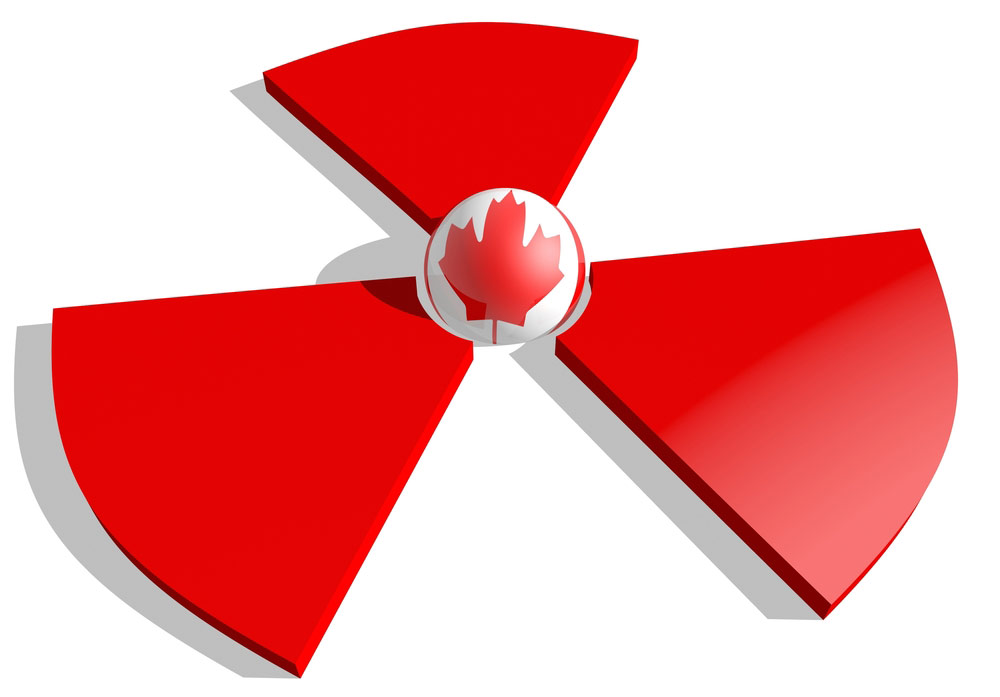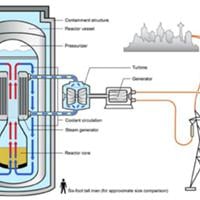Small reactors make no economic sense, despite the boost by Alberta Premier Jason Kenney and lobbyists.
David Climenhaga 10 Jan 2022 | Alberta Politics

‘Real solution’ for Canada? Former heads of nuclear regulatory committees in the UK, US, Germany and France just announced that ‘nuclear is not a practicable means to combat climate change.’
Image via Shutterstock.
Small nuclear reactors don’t make any more economic sense now than they did back in the summer of 2020 when Alberta Premier Jason Kenney took to the internet to tout the supposed benefits of the largely undeveloped technology being promoted by Canada’s nuclear industry.
In a year with plenty of gripping issues to choose from, these were the big draws in our pages.
Now that Kenney has taken to Twitter again to claim atomic energy is a “real solution that helps reduce emissions” and that so-called small modular reactors can “strengthen and diversify our energy sector,” it’s worth taking another look at why the economics of small nuclear reactors don’t add up.
As I pointed out in 2020, “as long as natural gas is cheap and plentiful, small nuclear reactors will never make economic sense.”
Natural gas is somewhat more expensive now than it was then, but not enough to make a difference to that calculation when the massive cost of any new nuclear-energy project is considered.
Even “small modular reactors,” so named to reassure a public skittish about the term nuclear and wary of the costs and risks of atomic reactors, are extremely expensive. It would be more accurate to call them “medium-sized nuclear reactors.”
The Tyee is supported by readers like you Join us and grow independent media in Canada
For example, two such reactors built by Russia starting in 2006 were supposed to cost US$140 million. They ended up costing US$740 million by the time the project was completed in 2019.
Getting approvals for smaller reactors is time consuming, too. As environmentalist and author Chris Turner pointed out yesterday, the first small nuclear reactor approved in the United States “submitted its application in 2017, got approval late last year, could begin producing 700MW by 2029 if all goes perfectly. Solar will add double that to Alberta’s grid by 2023.” Indeed, the estimated completion date of the NuScale Power project may be even later.
The small reactors touted by many companies, often entirely speculative ventures, are nothing more than pretty drawings in fancy brochures. According to the International Atomic Energy Agency, there are about 50 concepts, but only a couple in the United States and Russia with massive amounts of government money behind them are anything more than pipedreams or stock touts’ pitches to investors.
And small nuclear reactors are less economical than big reactors, so power companies aren’t interested in building them; all but one proposed design requires enriched uranium, which Canada doesn’t produce, so they won’t do much for uranium mining in Alberta; and all the safety and waste-removal problems of big nukes continue to exist with small ones.
These points are documented in more detail my 2020 post, which also discussed why smaller reactors will never create very many jobs in Alberta, although they could be a boon to Ontario if the technology took off.
Kenney’s most recent tweet — which provides a link to a slick video touting nuclear power produced by the British newsmagazine the Economist, was posted on Jan. 6.
By coincidence, presumably, a communique issued the same day by the former heads of nuclear regulatory committees in the United Kingdom, United States, Germany and France concluded that “nuclear is not a practicable means to combat climate change.”
“The central message, repeated again and again, that a new generation of nuclear will be clean, safe, smart and cheap, is fiction,” the communique states.
Nuclear energy is neither cheap enough nor safe enough to provide an effective strategy against global climate change, the communique authors argued. “To make a relevant contribution to global power generation, up to more than 10,000 new reactors would be required, depending on reactor design.”
Among their key points:
Nuclear power more expensive than renewable energy on a similar scale
None of the problems of waste disposal have been solved
It’s so expensive financial markets won’t invest in it, so it requires massive public subsidies
No one is prepared to insure against the full potential cost of environmental and human impacts of accidental radiation releases
Construction timelines are too long for it to make a contribution to stopping global warming
So why are Canadian provinces like Alberta so enthusiastic about the idea?
Well, it provides a way for governments captured by the fossil fuel industry to show they’re doing something about climate change without actually doing anything about climate change.
Of course, just because nuclear power generators might reduce the carbon footprint of oilsands extraction, that doesn’t mean the oil extracted would not be burned elsewhere, contributing to climate change.
For a government like Kenney’s United Conservative Party, it’s also an opportunity to make positive-sounding announcements about new jobs in a new industry on days when news media would otherwise be concentrating on the latest scandal — nowadays pretty well every day.
Moreover, the UCP Government is being actively lobbied by the Canadian Nuclear Association, “the voice of the Canadian nuclear industry since 1960,” which “promotes the industry nationally and internationally.

Are Thousands of New Nuclear Generators in Canada’s Future?
Small nuclear reactors don’t make any more economic sense now than they did back in the summer of 2020 when Alberta Premier Jason Kenney took to the internet to tout the supposed benefits of the largely undeveloped technology being promoted by Canada’s nuclear industry.
In a year with plenty of gripping issues to choose from, these were the big draws in our pages.
Now that Kenney has taken to Twitter again to claim atomic energy is a “real solution that helps reduce emissions” and that so-called small modular reactors can “strengthen and diversify our energy sector,” it’s worth taking another look at why the economics of small nuclear reactors don’t add up.
As I pointed out in 2020, “as long as natural gas is cheap and plentiful, small nuclear reactors will never make economic sense.”
Natural gas is somewhat more expensive now than it was then, but not enough to make a difference to that calculation when the massive cost of any new nuclear-energy project is considered.
Even “small modular reactors,” so named to reassure a public skittish about the term nuclear and wary of the costs and risks of atomic reactors, are extremely expensive. It would be more accurate to call them “medium-sized nuclear reactors.”
The Tyee is supported by readers like you Join us and grow independent media in Canada
For example, two such reactors built by Russia starting in 2006 were supposed to cost US$140 million. They ended up costing US$740 million by the time the project was completed in 2019.
Getting approvals for smaller reactors is time consuming, too. As environmentalist and author Chris Turner pointed out yesterday, the first small nuclear reactor approved in the United States “submitted its application in 2017, got approval late last year, could begin producing 700MW by 2029 if all goes perfectly. Solar will add double that to Alberta’s grid by 2023.” Indeed, the estimated completion date of the NuScale Power project may be even later.
The small reactors touted by many companies, often entirely speculative ventures, are nothing more than pretty drawings in fancy brochures. According to the International Atomic Energy Agency, there are about 50 concepts, but only a couple in the United States and Russia with massive amounts of government money behind them are anything more than pipedreams or stock touts’ pitches to investors.
And small nuclear reactors are less economical than big reactors, so power companies aren’t interested in building them; all but one proposed design requires enriched uranium, which Canada doesn’t produce, so they won’t do much for uranium mining in Alberta; and all the safety and waste-removal problems of big nukes continue to exist with small ones.
These points are documented in more detail my 2020 post, which also discussed why smaller reactors will never create very many jobs in Alberta, although they could be a boon to Ontario if the technology took off.
Kenney’s most recent tweet — which provides a link to a slick video touting nuclear power produced by the British newsmagazine the Economist, was posted on Jan. 6.
By coincidence, presumably, a communique issued the same day by the former heads of nuclear regulatory committees in the United Kingdom, United States, Germany and France concluded that “nuclear is not a practicable means to combat climate change.”
“The central message, repeated again and again, that a new generation of nuclear will be clean, safe, smart and cheap, is fiction,” the communique states.
Nuclear energy is neither cheap enough nor safe enough to provide an effective strategy against global climate change, the communique authors argued. “To make a relevant contribution to global power generation, up to more than 10,000 new reactors would be required, depending on reactor design.”
Among their key points:
Nuclear power more expensive than renewable energy on a similar scale
None of the problems of waste disposal have been solved
It’s so expensive financial markets won’t invest in it, so it requires massive public subsidies
No one is prepared to insure against the full potential cost of environmental and human impacts of accidental radiation releases
Construction timelines are too long for it to make a contribution to stopping global warming
So why are Canadian provinces like Alberta so enthusiastic about the idea?
Well, it provides a way for governments captured by the fossil fuel industry to show they’re doing something about climate change without actually doing anything about climate change.
Of course, just because nuclear power generators might reduce the carbon footprint of oilsands extraction, that doesn’t mean the oil extracted would not be burned elsewhere, contributing to climate change.
For a government like Kenney’s United Conservative Party, it’s also an opportunity to make positive-sounding announcements about new jobs in a new industry on days when news media would otherwise be concentrating on the latest scandal — nowadays pretty well every day.
Moreover, the UCP Government is being actively lobbied by the Canadian Nuclear Association, “the voice of the Canadian nuclear industry since 1960,” which “promotes the industry nationally and internationally.

Are Thousands of New Nuclear Generators in Canada’s Future?
READ MORE
According to the Alberta Lobbyist Registry, Calgary-based New West Public Affairs, a firm with close ties to the Kenney government headed by former Harper government minister Monte Solberg, has been engaged to “facilitate introductions for the Canadian Nuclear Association and share information on small modular reactors” with various government departments.
New West was hired “specifically, to generate support for the technology and to identify if there is an opportunity in Alberta’s mining and oil and gas sectors for the deployment of new low carbon energy sources, including nuclear,” the registry entry says.
The CNA is also using Ottawa-based Earnscliffe Strategies, one of Canada’s best-known lobby firms, to seek “support for clean electricity — including nuclear electricity — as a foundation for emissions reduction in Canada.” In addition, Earnscliffe is lobbying for “support for the research and development of small modular reactors.”
According to the Alberta Lobbyist Registry, Calgary-based New West Public Affairs, a firm with close ties to the Kenney government headed by former Harper government minister Monte Solberg, has been engaged to “facilitate introductions for the Canadian Nuclear Association and share information on small modular reactors” with various government departments.
New West was hired “specifically, to generate support for the technology and to identify if there is an opportunity in Alberta’s mining and oil and gas sectors for the deployment of new low carbon energy sources, including nuclear,” the registry entry says.
The CNA is also using Ottawa-based Earnscliffe Strategies, one of Canada’s best-known lobby firms, to seek “support for clean electricity — including nuclear electricity — as a foundation for emissions reduction in Canada.” In addition, Earnscliffe is lobbying for “support for the research and development of small modular reactors.”

Kenney and lobbyists.

David Climenhaga is an award-winning journalist, author, post-secondary teacher, poet and trade union communicator. He blogs at AlbertaPolitics.ca. Follow him on Twitter at @djclimenhaga.
No comments:
Post a Comment